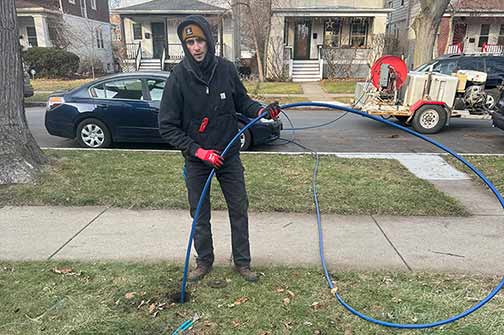
Do you use chemical drain cleaners as the go-to method for clearing out the clogged drains in your home? Chemical drain cleaners are marketed as a fast, reliable, affordable, and hassle-free option for unclogging blocked drains.
This claim is only partly true, says Mabry Property Management.
What is also true is that there are several things you don’t know about chemical drain cleaners. Today, we look at chemical drain cleaners, how they work, the risks they pose to your drains, and the best alternative to chemical drain cleaners.
What are chemical drain cleaners, and how do they work?
Chemical drain cleaners are drain-cleaning solutions that rely on chemical reactions to remove clogs inside your drainage pipes. Unlike other drain-cleaning methods, they do not rely on mechanical actions to unclog your blocked drains.
Chemical drain cleaners come in liquid, gel, or powder form. The three main types of chemical drain cleaners are caustic, oxidizing, and acid drain cleaners. Drain cleaners employ a wide range of substances as their active agents.
How do chemical drain cleaners work?
Every brand of chemical drain cleaner contains its own unique set of ingredients, but most are similar in one very important respect. They rely on the sudden release of intense heat within the pipes to clear the clogged drain.
Because of this, chemical drain cleaners pose a huge risk to PVC pipes. The heat generated by the active agent in the drain cleaner can melt plastic pipes, thereby compounding the issues in the drain line. Yet, this is not the only problem with chemical drain cleaners.
The trouble with using chemical drain-cleaners
- Chemical damage
In addition to heat damage, the powerful corrosives in chemical drain cleaners can destroy metal and plastic pipes. Older drain lines are highly vulnerable to damage by chemical drain cleaners.
- They are ineffective
Chemical drain cleaners don’t clear your drains. They eat through the blockage, leaving a hole for water to pass through. The rest of the clog stays inside the pipe and worsens with time.
- A safety hazard
Being denser than water, chemical drain-cleaners sink to the bottom of drainpipes and remain there. This toxic cocktail poses a danger to plumbers and anyone working with the pipes.
- Worsens blockages
Chemical drain cleaners may combine with the debris inside a drain pipe to form a cement-like residue. If this happens, it will defeat the purpose of using a chemical drain cleaner.
- Harms the environment
Chemical drain-cleaners may leach into the surrounding soil, find their way into groundwater, or enter nearby water bodies. They pose a major threat to wildlife, plants, soil, and humans.

What to use instead of chemical drain cleaners
Instead of chemical drain cleaners, the best way to clear out a blocked drain line without subjecting the pipes to avoidable risk is HYDRO-JETTING. What is hydro-jetting, and why is it the preferred option for chemical drain cleaners?
Hydro-jetting uses high-pressure water jets to clear clogs and debris inside your drainpipes and sewer lines. Hydro-jetting equipment comprises a stainless steel nozzle mounted on the end of a flexible cable.
This cable, with the attached nozzle, is inserted into a blocked drain while the other end is hooked to a pressurizing machine. A jet stream of water with an average force of 1500 psi is then fired into the pipe to clear out the clogs and debris inside the pipes.
Advantages of hydro-jetting over chemical drain-cleaners
- Hydro-jetting is versatile
It is effective for clearing every kind of buildup found in drain lines, including grease, sediment, tree roots, scale, ice, sand, and silt. Hydro-jetting works for residential and commercial plumbing, as well as pipes of all sizes.
- Thorough cleaning
Hydro-jetting will sour the walls of your pipes. It will get rid of the dirt clinging to the pipe surfaces. In addition to breaking up the debris inside the pipes, hydro-jetting flushes the dirt from your drains.
- Uses only water
No toxic or corrosive chemicals are used in hydro-jetting. There is no risk of heat or chemical damage to pipes. No chemical residue is left behind inside the drain lines, and no harm is done to the environment.
- Fast and affordable
The cost of hydro-jetting your drains is insignificant compared to the long-term damage of using chemical drain cleaners. By hydro-jetting your pipes, you prolong the life of your drainage system. Hydro-jetting does not take a lot of time.
- Perfect for preventive maintenance
Chemical drain cleaners complicate your drainage maintenance plan while inflating the cost of caring for your plumbing. Hydro-jetting, on the other hand, makes it easier to manage your drainage. By hydro-jetting your pipes on a schedule, you terminate the processes that cause clogs and blockages in the line.
Does your drainage system need hydro-jetting?
The answer is YES if you have chronically slow or clogged drains in your home. You also need hydro-jetting if you are dealing with sewage odors inside your home. Lastly, you need hydro-jetting if you are looking for a cost-effective way to maintain your drainage system.